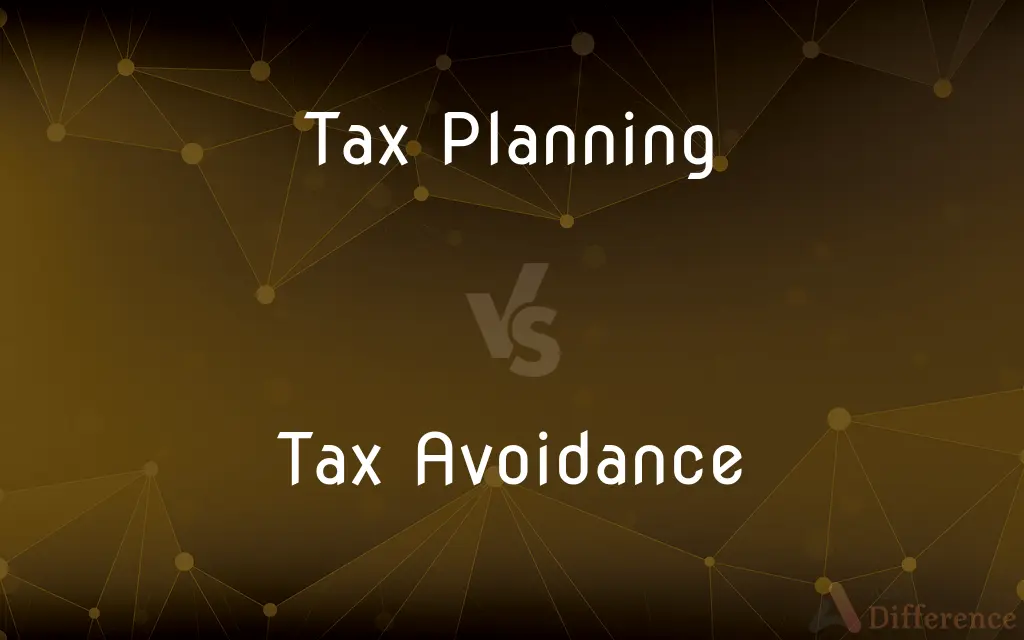Tax Planning vs. Tax Avoidance — What's the Difference?
By Tayyaba Rehman — Published on October 25, 2023
Tax Planning vs. Tax Avoidance: Tax Planning involves legally strategizing to minimize tax liabilities, while Tax Avoidance pertains to methods used to reduce or evade taxes, often pushing legal boundaries.

Difference Between Tax Planning and Tax Avoidance
Table of Contents
ADVERTISEMENT
Key Differences
Tax Planning is a proactive and legal approach to structure one's finances to reduce tax liabilities. In contrast, Tax Avoidance involves using methods, sometimes on the edge of legality, to lessen or evade tax obligations.
Individuals or entities utilize Tax Planning to optimize their financial actions with the goal of paying the least amount of taxes while still complying fully with the law. Tax Avoidance, however, may employ aggressive strategies that could skirt the edge of legal acceptability.
While Tax Planning is always within the bounds of tax laws and regulations, Tax Avoidance often requires careful scrutiny to determine its legality. Some avoidance methods can be legitimate, but others can cross the line.
The primary objective of Tax Planning is to achieve a financial goal with the least possible tax expense by leveraging available tax benefits. Tax Avoidance, on the other hand, focuses more on finding gaps or ambiguities in tax laws to reduce the tax burden.
Both Tax Planning and Tax Avoidance aim at reducing tax payments. However, planning is transparent, straightforward, and legal, whereas avoidance might entail complexities that could be legally questionable.
ADVERTISEMENT
Comparison Chart
Nature
Legal and transparent.
May push legal boundaries.
Objective
Minimize tax liabilities within legal means.
Reduce or evade taxes, exploiting legal ambiguities.
Approach
Proactive and strategic.
Potentially aggressive and complex.
Lawful Compliance
Always compliant with tax laws.
Can be in the gray area of tax laws.
Perception
Generally viewed positively.
Often scrutinized and can be seen as questionable.
Compare with Definitions
Tax Planning
A proactive approach to foresee tax implications.
With efficient tax planning, the company avoided year-end financial surprises.
Tax Avoidance
Strategies that minimize tax, risking potential legal implications.
The new regulations were introduced to curb aggressive tax avoidance tactics.
Tax Planning
Organizing finances to reduce tax liability within the law.
Proper tax planning can help businesses save significantly on taxes.
Tax Avoidance
Actively seeking ways to minimize tax, potentially skirting legality.
The businessman faced penalties after his tax avoidance methods were deemed illegal.
Tax Planning
Legally strategizing to optimize tax positions.
By tax planning in advance, Jane managed to utilize all her eligible deductions.
Tax Avoidance
Exploiting ambiguities in tax laws to pay less tax.
Tax avoidance schemes that exploit loopholes can come under scrutiny from tax authorities.
Tax Planning
Leveraging legal provisions to minimize tax expense.
The new tax law changes required a re-evaluation of our tax planning strategies.
Tax Avoidance
Using methods to reduce tax, sometimes pushing legal limits.
Some multinational companies face criticism for their tax avoidance strategies.
Tax Planning
Planning financial actions to benefit from tax laws.
Early tax planning allows for better financial decision-making throughout the year.
Tax Avoidance
Legally or questionably evading tax obligations.
Offshore accounts are often associated with tax avoidance.
Common Curiosities
Can Tax Avoidance lead to penalties?
Yes, if the methods of tax avoidance are found to be illegal, they can lead to penalties and legal consequences.
Is Tax Avoidance illegal?
Not all tax avoidance is illegal, but aggressive methods that exploit legal ambiguities can be deemed illegal upon scrutiny.
How does Tax Planning differ from Tax Avoidance?
Tax Planning is a legal method to minimize tax liabilities, while Tax Avoidance may push legal boundaries to reduce taxes.
Why is Tax Planning encouraged?
Tax Planning is encouraged as it helps individuals and businesses optimize their tax positions legally and transparently.
Does Tax Planning exploit legal ambiguities?
No, Tax Planning operates within clear legal boundaries, unlike some Tax Avoidance methods.
What is the primary goal of Tax Planning?
The primary goal of Tax Planning is to achieve financial objectives with the least possible tax expense within legal means.
How do governments view Tax Avoidance?
Governments often scrutinize tax avoidance, especially if it exploits loopholes, and may introduce laws to curb such practices.
Why do some entities engage in Tax Avoidance?
Some entities engage in Tax Avoidance to exploit legal gaps or ambiguities and reduce their tax burden.
Is all Tax Avoidance scrutinized by tax authorities?
While not all tax avoidance is scrutinized, aggressive and questionable methods likely attract the attention of tax authorities.
Can good Tax Planning result in substantial tax savings?
Yes, efficient and effective Tax Planning can lead to significant tax savings while staying within legal parameters.
Share Your Discovery

Previous Comparison
B2B vs. C2C
Next Comparison
Prokaryotic Ribosomes vs. Eukaryotic RibosomesAuthor Spotlight
Written by
Tayyaba RehmanTayyaba Rehman is a distinguished writer, currently serving as a primary contributor to askdifference.com. As a researcher in semantics and etymology, Tayyaba's passion for the complexity of languages and their distinctions has found a perfect home on the platform. Tayyaba delves into the intricacies of language, distinguishing between commonly confused words and phrases, thereby providing clarity for readers worldwide.














































